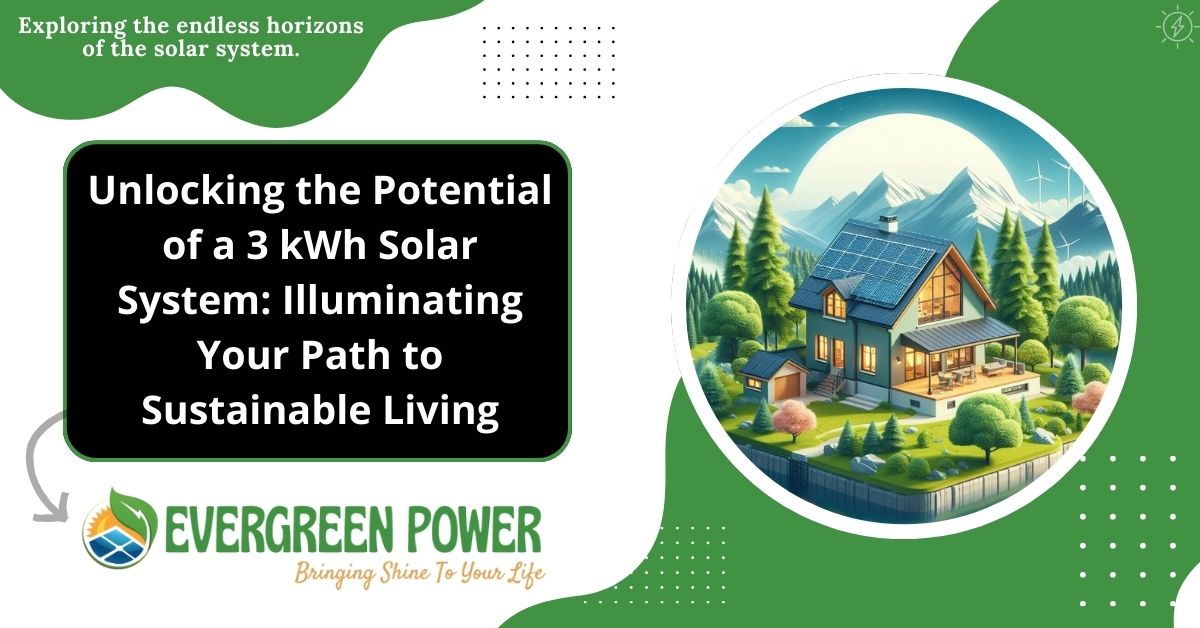Dive deep into the realm of solar energy with a comprehensive guide on 3 kWh solar systems. Explore the multitude of benefits, detailed installation procedures, and answers to frequently asked questions (FAQs) to empower your journey toward a greener tomorrow.
Introduction:
In an era where environmental consciousness reigns supreme, the adoption of renewable energy sources like solar power has emerged as a beacon of hope. Among the myriad options available, a 3 kWh solar system stands out as an ideal choice for homeowners seeking to embrace sustainability while reducing their reliance on traditional power sources. In this extensive guide, we embark on a journey to unravel the intricacies of a 3 kWh solar system, shedding light on its numerous advantages, and installation intricacies.

Understanding the Fundamentals of 3 kWh Solar System:
A 3kW solar system, with a capacity to generate 3,000 watts of electricity, represents a significant step towards energy independence and environmental responsibility. This system typically comprises:
- Solar Panels: These photovoltaic (PV) panels act as workhorses, capturing sunlight and converting it into direct current (DC) electricity. A 3kW system usually requires 6 to 8 solar panels, each with a capacity of around 500 watts.
- Solar Inverter: The brains of the operation, the inverter transforms the DC electricity generated by the panels into usable alternating current (AC) electricity, compatible with your home’s appliances.
- Mounting System: This crucial framework serves as the foundation, securely holding the panels in place for optimal sunlight exposure and withstand various weather conditions.
- Optional Components: Depending on your specific needs and budget, you might consider adding batteries for energy storage (hybrid system) or participating in a net metering program to sell excess electricity back to the grid.
Unleashing the Power: What Can a 3 kWh Solar System Run?
The ability of a 3kW system to power your appliances depends on a unique combination of factors:
- Appliance Wattage: Different appliances require varying amounts of power to operate, ranging from low-consumption LED lights to high-demand air conditioners.
- Sunlight Exposure: The amount of sunlight your location receives significantly impacts electricity generation. Regions with abundant sunshine hours naturally generate more electricity.
- Daily Electricity Usage: Understanding your average daily or monthly electricity consumption is crucial for determining if a 3kW system can meet your needs.
While a 3kW system might not be sufficient for powering high-wattage appliances like dryers or ovens, it can effectively run essential appliances like:
- LED lights, significantly reduce your lighting energy consumption.
- Fans, keep your home cool and comfortable without relying solely on the grid.
- A refrigerator is a crucial appliance that can operate efficiently on a 3kW system.
- Washing machine (depending on size and cycle), allowing you to clean clothes while minimizing your carbon footprint.
- Small electronics, powering everyday devices like laptops, phones, and chargers.
3kW Solar System Price in Pakistan
A large number of Pakistani homes consume between 300 and 400 units of electricity each month. They still have to pay higher electricity bills, however, despite their lower consumption of electricity, as a result of higher electricity rates per unit and additional taxes imposed by Pakistani authorities and the local energy provider.
A 3kW solar system is the most suitable solution for households that consume less energy but pay more for electricity, such as households that consume between 300 and 400 units of electricity per month.
Approximately Rs. 580000 is the cost of a 3kW solar system in Pakistan, which includes the installation charge, the solar panels, the 5kW solar inverter, and the mounting structure.
3kW solar systems will be explained in detail, along with their energy production capabilities, their price in Pakistan, and their application areas. It will also discuss pricing for on-grid and hybrid solar systems, as well as multiple options for selecting the desired solar panels and solar inverters, which can influence the cost of a 3kW solar system.
On-Grid 3kW Solar System Price in Pakistan
Grid-tied or on-grid solar systems are connected to the grid electricity as well as the solar panels. When you consume more electricity than the system produces or when there is no electricity produced by the solar panels at night, the inverter in your on-grid solar system is capable of switching to grid power.
It costs approximately Rs. between 400,000 to 700,000 PKR (net metering included) to install a 3kW solar system on a grid in Pakistan. A 3kW solar system will cost 580,000 PKR if you don’t include net metering.
- An on-grid 3 kw solar system with a 5 kW inverter without net metering costs Rs. 580,000 PKR
- In Pakistan, the cost of an on-grid 3kw solar system with a 5kw inverter is Rs. 700,000 PKR.
Price for 3kW solar system with 5kW inverter
In Pakistan, Growatt inverters are highly popular among solar enthusiasts for their high efficiency and affordable price. Today, a 3kW solar system with a Growatt inverter costs approximately 700,000 Pakistani rupees.
- There is a price range of 700,000 Pakistani rupees for a 3 kW solar system consisting of three solar panels and a five kW Growatt inverter
Solis Inverter with 3kW On-Grid Solar System in Pakistan
Solis is one of the most popular inverter brands in Pakistan. In Pakistan, the cost of a 3kW on-grid solar system with a 5kW Solis inverter is approximately 580,000 Pakistani rupees.
- The price of a 3kw solar system in Pakistan – including a 3kW on-grid solar panel system with a 5kW Solis inverter – is approximately 580,000 Pakistani rupees
Off-Grid 3kW Solar System Price in Pakistan
As a result of their higher installation costs, off-grid solar systems are less common. In contrast to an on-grid solar system, where the system is connected to the grid, and batteries and generators are used as energy backups, an off-grid solar system is disconnected from the grid. Off-grid inverters can switch between the electricity produced by solar panels, batteries, and generators seamlessly and without interruption within a fraction of a second.
Off-grid 3kW solar systems in Pakistan are more expensive due to the addition of additional batteries, an inverter, and generators as backup options. Providing an exact price for a 3kW solar system in Pakistan is challenging because it is dependent upon how many solar batteries and generators are added.
If you would like to obtain a quote for the price of an off-grid 3kW solar system in Pakistan, simply contact us and an estimate will be provided to you as soon as possible based on your specific needs and requirements.

3kW Hybrid Solar System Price
Approximately 3kW hybrid solar systems are the most common solar systems used in Pakistan, as they provide an uninterrupted power supply, even during power outages or at night. A hybrid inverter can be switched between solar panel, battery, and grid power, making it also referred to as a multi-mode inverter.
There will also be a cost associated with adding two 185-amp batteries to a hybrid 3kW solar system in Pakistan. On average, two 185-amp batteries are added to a 3kW solar system. A 12V battery will cost you over 40,000 PKR, and hybrid inverters are also more expensive than on-grid inverters, and their price will also affect the overall cost.
Battery-powered hybrid solar system for 3kW
The 3kW hybrid solar system is the most commonly used solar system in Pakistan, and with the addition of net metering, people can enjoy even more benefits. In Pakistan, a hybrid 3kW solar system costs approximately Rs. 385,000, assuming a 3kW hybrid system with batteries that cost Rs 500,000.
PKR 500,000 for a hybrid 3kW system with batteries in Pakistan
PKR 385,000 for a hybrid 3kW solar system without batteries
3kW Hybrid Solar System in Pakistan with SolarMax Orion Inverter
The Solarmax Orion inverters have gained a remarkable reputation for their efficiency and reliability. With their outstanding AC-to-DC conversion capabilities, Orion inverters ensure optimal performance on both domestic and commercial systems. It is estimated that you would need to spend approximately 580,000 Pakistani rupees (excluding batteries) if you would like to purchase a hybrid solar system of 3kW with an Orion Inverter.
3kW Hybrid Solar System Price in Pakistan
Depending on the specific components and installation costs that will need to be taken into account when calculating the hybrid 3kW solar system price in Pakistan, the approximate hybrid 3kW solar system price with MaxPower SunBridge inverter may range between 400,000 to 700,000 PKR
The following factors can affect the Hybrid 3kW Solar System price in Pakistan:
- Depending on the brand, efficiency, and wattage of a solar panel, the price will vary.
- An inverter’s price also varies according to its brand, capacity, and features.
- Batteries are priced according to their type, capacity, and warranty.
- Cost of installation: The cost of installation will vary depending on the system’s size and complexity.
Advantages of a 3 kWh Solar System:
Economic Empowerment through Savings:
Harnessing the power of solar energy translates into substantial long-term savings on electricity bills. With a 3 kWh solar system, homeowners can generate a significant portion of their energy needs, thereby reducing dependency on grid electricity and its associated costs.
Environmental Stewardship:
By transitioning to solar energy, homeowners play a pivotal role in mitigating climate change and reducing their carbon footprint. A 3 kWh solar system enables the generation of clean, renewable energy, thereby minimizing harmful emissions and contributing to a healthier planet for future generations.
Energy Independence and Security:
Embracing solar power empowers homeowners with a sense of energy independence and security. With a 3 kWh solar system, individuals can produce their electricity on-site, reducing vulnerability to external factors such as power outages or fluctuations in energy prices.
Minimal Maintenance Requirements:
Solar panels are renowned for their durability and low maintenance needs. Once installed, a 3 kWh solar system typically requires minimal upkeep, with occasional cleaning to ensure optimal performance, making it a hassle-free renewable energy solution for homeowners.
Long-Term Investment:
Investing in a 3 kWh solar system is akin to investing in a sustainable future. With a lifespan of 25-30 years for solar panels and the potential for significant savings on energy bills, the installation of a solar system represents a wise and enduring investment in both financial and environmental terms.
Installation Process Demystified:
Thorough Site Assessment: The journey towards installing a 3 kWh solar system begins with a comprehensive assessment of the property. Factors such as roof orientation, shading, and structural integrity are meticulously evaluated to determine the optimal placement of solar panels for maximum sunlight exposure and efficiency.
Design Customization and Regulatory Compliance: Following the site assessment, a bespoke solar system design is crafted to meet the unique energy requirements and architectural nuances of the property. The design must adhere to local regulations and building codes, with necessary permits obtained before the commencement of installation.
Precise Panel Installation: With design specifications finalized and permits secured, the installation process commences with the mounting of solar panels on the designated area of the roof or ground. Careful attention is paid to ensure the panels are securely affixed and properly angled to optimize solar absorption.
Integration of Inverter Technology: Inverters play a pivotal role in the solar energy ecosystem, converting the solar panels’ direct current (DC) electricity generated into alternating current (AC) electricity suitable for household consumption. The installation of inverters, whether string inverters or microinverters, is conducted with precision to ensure seamless integration with the solar array.
Grid Connection and System Activation: For homeowners opting for grid-tied solar systems, the final step involves connecting the solar system to the utility grid. This enables the seamless flow of electricity between the solar installation and the grid, facilitating net metering arrangements and ensuring uninterrupted access to power as needed.

FAQs
How much roof space is required for a 3 kWh solar system installation?
The space requirements for a 3 kWh solar system vary depending on factors such as panel efficiency and energy consumption patterns. On average, an installation may necessitate approximately 200-300 square feet of roof space.
What is the typical lifespan of a 3 kWh solar system?
Solar panels boast a lifespan of 25-30 years under optimal conditions, with inverters and other components typically requiring replacement every 10-15 years to ensure continued efficiency and performance.
Is it feasible to undertake a DIY installation of a 3 kWh solar system?
While DIY solar installations are theoretically possible, they are not recommended for the majority of homeowners due to safety concerns, regulatory compliance issues, and the intricacies involved in system design and integration. Professional installation ensures optimal performance and adherence to industry standards.
What level of maintenance is required for a 3 kWh solar system?
Solar panels are renowned for their low maintenance requirements, typically necessitating periodic cleaning to remove dust and debris that may accumulate over time. Inverters and other system components may require occasional inspections and servicing as recommended by manufacturers.
Is the inclusion of battery storage essential for a 3 kWh solar system?
While battery storage is not a prerequisite for a 3 kWh solar system, it can enhance energy autonomy and resilience by enabling homeowners to store excess solar energy for use during periods of low sunlight or grid outages. The decision to incorporate battery storage depends on individual energy needs and preferences.
What financial incentives are available for installing a 3 kWh solar system?
Incentive programs for solar installations vary by region and may include federal or state tax credits, rebates, grants, and net metering arrangements. It’s advisable to research available incentives and consult with solar providers to maximize potential savings and benefits.
Conclusion:
In pursuing a sustainable and energy-efficient lifestyle, the adoption of solar power emerges as a transformative solution with far-reaching benefits. A 3 kWh solar system epitomizes the marriage of innovation and sustainability, offering homeowners a gateway to reduced energy costs, environmental stewardship, and energy independence. By unraveling the complexities of solar system installation and addressing common queries through comprehensive FAQs, this guide aims to empower individuals to embrace solar energy and embark on a journey toward a brighter, cleaner future.

